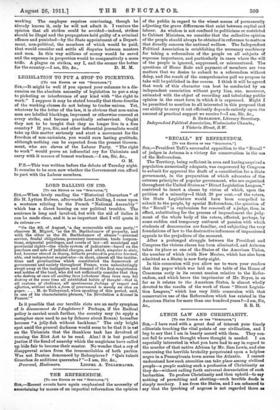LORD DALLING ON 1789.
[To THE EDITOR OF ram "SPEcraTos."] SIR,—When lately reading the "Historical Characters " of Sir H. Lytton. Bulwer, afterwards Lord Drilling, I came upon a sentence relating to the French "National Assembly"
which has a direct bearing on our political troubles. The sentence is long and involved, but with the aid of italics it
can be made clear, and it is so important that I will quote it in extenso "On the 4th of August, a day memorable with one party,'" observes M. Mignet, 'as the St. Bartholomew of property, and with the other as the St. Bartholomew of abuses '—personal service, feudal obligations, pecuniary immunities, trade corpora- tions, seignorial privileges, and courts of law—all municipal and provincial rights—the whole system of judicature based on the purchase and sale of judicial charges, and which, singular to state, had, however absurd in theory, hitherto produced in practice learned, able, and independent magistrates—in short, almost all the institu- tions and peculiarities which constituted the framework of government and society throughout France, were unhesitatingly swept away at the instigation and demand of the first magistrates and nobles of the land, who did not sufficiently consider that they who destroy at once all existing laws (whatever these laws may be) destroy at the same time all established habits of thought—that is, all customs of obedience, an spontaneous feelings of respect and affection, without which a form of government is merely an idea on paper. . . . M. de Talleyrand, when speaking of this period, said, in one of his characteristic phrases, 'La RAvolution a &Bosse la France:" Is it possible that our terrible riots are an early symptom of is clesossement de VAngleterre? Perhaps, if the Radical, policy is carried much further, the country may (to apply a
metaphor once used to me by Scherer about Renan) hereafter become "a jelly-fish without backbone." The only bright
spot amid the general darkness would seem to be that it is not on the Unionists that the thankless task has devolved of causing the Riot Act to be read. Alas I it is but poetical justice if the fiend of anarchy which the magicians have called up bids fair to become their master. No wonder that a cry of disapproval arises from the irreconcila,bles of both parties.
Was not Danton denounced by Robespierre ? ," Quis tulerit Gracchos de seditione qnerentes P "—I am, Sir, &c.,


































 Previous page
Previous page